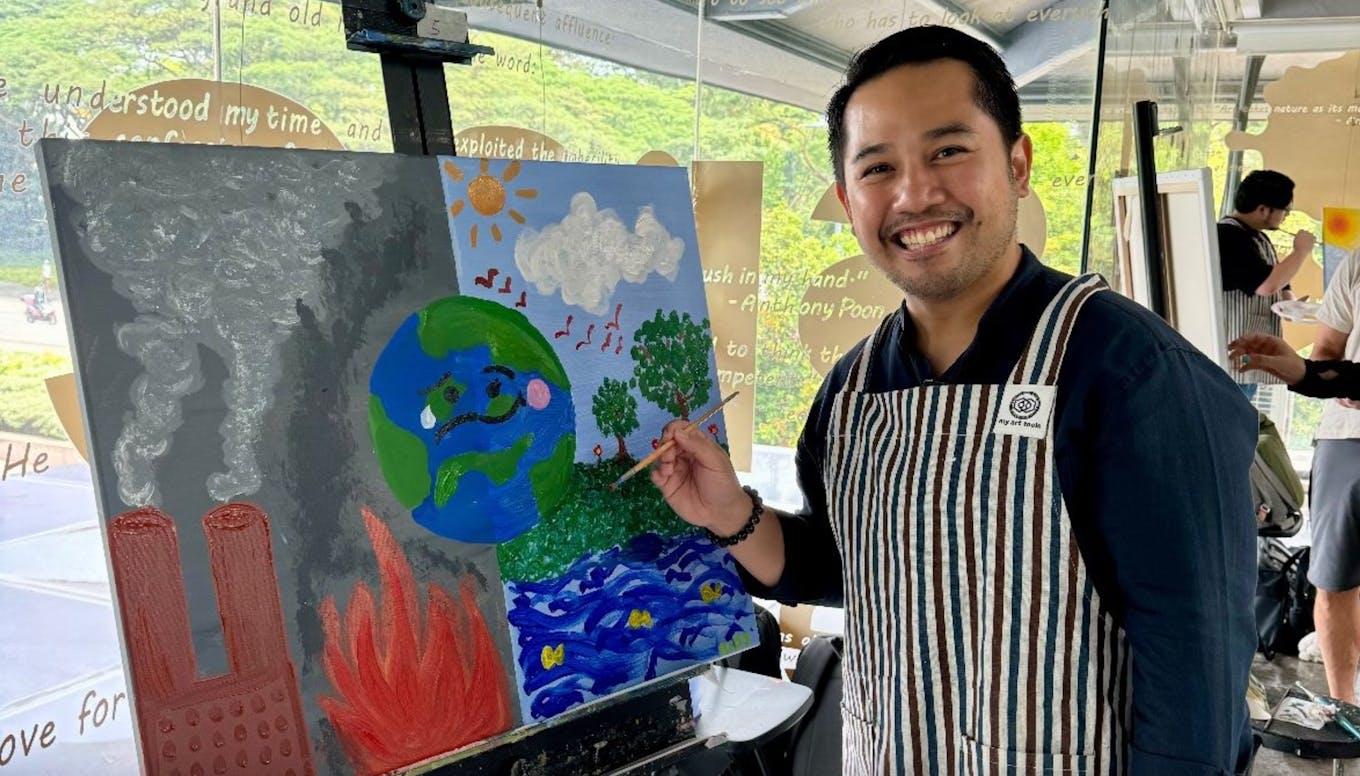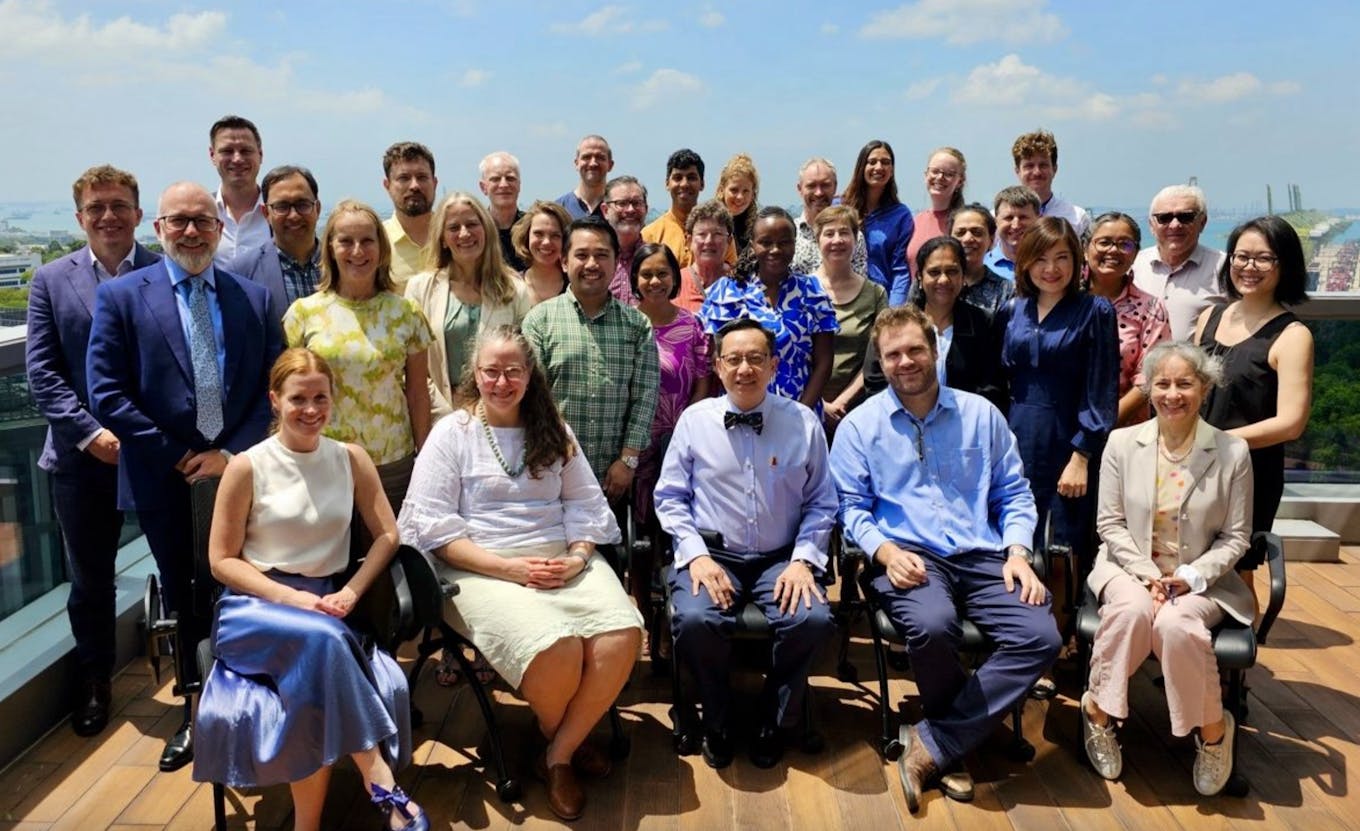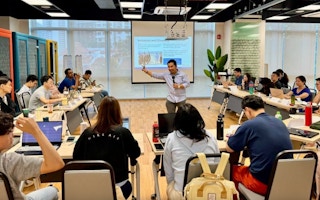Academic Renzo Guinto believes only big and bold changes can heal a planet in a poor state of health.
Totally reform current economic systems, he says. Decolonise the global health system and dismantle Western biases. Go beyond the United Nations’ Sustainable Development Goals (SDGs) that he believes only address the symptoms of the climate crisis.
“I know what I say may sound utopian, but we need to dream big … We need an economy that truly respects the planet’s boundaries.”
The Filipino academic is also alarmed when people fail to see the link between fossil fuels and planetary health immediately. To him, it is crystal clear that all health professionals should be supporting the phase out of coal and other polluting energy sources because they harm both the planet and human health.
At the COP28 climate summit last year, which hosted its first-ever “health day” and where health emerged as a pivotal focus, Guinto took the opportunity to voice his opposition to fossil fuels. At the same time, while he saluted the progress made in acknowledging health as part of the climate agenda, he questioned the true motivation behind its initiation and the endorsement of health day from entities profiteering from fossil fuels and the climate crisis, including the COP28 presidency.
“
We need to be wary of the “healthwashing” at COP. Even harmful industries or corporations supporting and sponsoring coal are pretending to talk about health now. We should not allow health day at COP to be misused by companies who just want to look good.
Earlier this year, Guinto moved into a new role as associate professor at Singhealth Duke-NUS Global Health Institute (SDGHI), run by the Duke-NUS Medical School, a graduate medical school in Singapore, after spending nearly four years at private non-profit healthcare institution St Luke’s Medical Centre in Quezon City in the Philippines.
The topics he pursues in his research on planetary health – addressing inequalities in the health system, recognising the need for diversity and inclusion – adds a fresh perspective for classroom discussions among health professionals in the city-state. Guinto has also been tasked to set up a new Asia-wide network focused on advancing collaboration on healthcare research and advocacy.
On World Health Day, Guinto speaks to Eco-Business and discusses the issues he believes are important in the planetary health movement.

Renzo Guinto believes that the world needs an economy that respects the planet’s boundaries. Image: Renzo Guinto / LinkedIn
Tell us one message you would like to share on World Health Day.
You cannot fully enjoy the right to health if you are not able to enjoy the right to a clean and healthy environment. Given the climate crisis and the many problems that are at the nexus of human health and the environment, I believe planetary health is an unavoidable topic. What happens to the planet affects us in many ways and we need an integrated and holistic approach towards health.
For example, if you consistently breathe in unhealthy air, your lungs will be affected. Air pollution is still a major issue in many Asian cities. The right to food should also be further refined to specifically mean the right to healthy, nutritious, clean, safe and sustainably-produced food.
An article I recently co-wrote with my colleagues challenges the power dynamic in food governance. It discusses the undue influence of transnational corporations and political actors in shaping the food system. There is near total disregard for and neglect of local farming and fishing communities – those who produce our food – in the conversations we have around food. Their lack of power leads to their poor health. They earn very little, so little that they sometimes cannot purchase the food they produce. It is an irony, and it is not a new problem so something must be wrong. Why haven’t we addressed it?
There are many case studies on these farming communities in glossy publications published by institutions such as the United Nations, but the problem is not solved. It bothers me a lot, and I consistently ask myself: How can I contribute to ending this vicious cycle?
Consumers are also not really at the table when it comes to decision-making, but we are often fed with unhealthy products that make us sick and are not sustainably-produced.
Because we are very busy, many people tend to address only the immediate and micro issues, because they are more manageable. But addressing the collective health of both the planet and people requires bigger, systematic changes. Major transformative action is needed to reform our food and energy systems.
Why should we care about food systems and their governance?
During the Covid-19 pandemic, we saw how a single disruption can make it difficult for people to access our essential needs, including food. In the Philippines, food assistance programmes became crucial for survival. It made us realise that the government and big corporations have the power and the ability to disburse such assistance.
The climate crisis is affecting food systems in many different ways too. But it is a “slow burn crisis” and a long term challenge. It is not like the pandemic when borders close overnight and you suddenly cannot get food, but there is an impact. How are we preparing for these impacts? We are not talking much about it. This needs to change.
People are also starting to forget about the disruptions during Covid-19. Life has moved on and there is amnesia.
How do we sustain these important conversations?
There is a role for the media to keep on reminding society about the urgency of these problems, about the need for lasting and durable solutions, and that these solutions do exist. We already know which solutions are good for the health of the planet. Take for example renewable energy. We’ve seen higher renewables penetration, solar is cheaper than before but it’s still not mainstream enough.
I also think the war in Gaza has distracted everyone from longer term existential threats like climate change. I am not saying that the Gaza issue is less important. We want peace there. But because of the ongoing war, climate is less on the agenda. It is worrying because I believe we urgently need to change the global economic system [to tackle the climate crisis]. I am not an economist but I know for sure that the system is rotten.
Global [health and climate] governance systems need to be revised. I know this sounds utopian but we need to dream big. That only a few countries can make decisions on whether another country should have peace is defective, flawed and antediluvian. We need an economy that truly respects the planet’s boundaries. Right now, six out of nine planetary boundaries have been transgressed, suggesting that Earth is now well outside of the safe operating space for humanity.

The Lancet Commission on Sustainable Healthcare met in person for the first time in Singapore in March 2024. Renzo Guinto (third from left, second row) is part of the editorial advisory board of the Lancet Planetary Health journal. Image: Renzo Guinto / LinkedIn
What needs to be done?
The 17 Sustainable Development Goals (SDGs) and their 169 targets mostly now only address the symptoms of the crisis, but not its causes. Specifically on health, we need to go beyond thinking about the eradication of diseases but finance all health and wellbeing needs.
If you read the seminal paper on planetary health [by the Lancet Commission], it identifies three types of challenges and the first challenge is the imagination challenge. We are stuck in a box and not truly thinking out of the box. That is why we end up just focusing on putting out the fires rather than finding the root cause of these fires.
I also want to recommend the book The Good Ancestor by leading public philosopher Roman Krznaric. It is a thesis against short termism and a call for long term thinking or more precisely, “cathedral thinking”. Many cathedrals in Europe are unfinished, and cathedral thinking is about thinking in multiple generations, rather than one lifetime. It is about imagining projects that will outlive you, and that will require later generations to build on what we have accomplished. If we want to reform economic and governance systems, we need to start somewhere now. Thinking about planetary health invites us to be good ancestors. We do not want future generations to look back and say we were bad ancestors, that we were selfish and made the wrong decisions.
How far do you take your academic work on planetary health and when does it cross into activism?
There is positive activism one can engage in and that is when you inspire people to participate in a movement or to get involved. Activism is about fighting against powerful forces and that requires a lot of courage and I am supportive of it. I just wish we could see more good outcomes, but in a difficult political climate it can get really scary. Lives are endangered. For example, environmental defenders across Asia, including the Philippines, are facing threats to their lives. When we talk about planetary health, we cannot turn a blind eye to the inequalities and injustices that are still present today.
At last year’s COP28 climate summit, you were very vocal in calling out for a fossil fuels phase-out. Why is this issue important in the planetary health movement?
Public health experts have produced papers and articles showing the linkage between fossil fuels and the climate crisis, and we have been trying to communicate this for years. The links might not be intuitive to the layman so we need to communicate better, but the evidence is crystal clear. Fossil fuels are bad for the health of the planet and bad for people. There are also alternatives that are healthier.
A fossil fuels phase-out is a planetary health solution and I strongly believe more health professionals should be saying that. We’ve tried to say it at the COP28 summit.
COP28 also hosted the climate conference’s first ever health day and everyone was excited about it. Out of the 80,000 attendees at the summit, about 2,000 were health professionals. It was a big force and an improvement from the previous COPs. Someone was joking about how in the previous COPs, you could put all the health professionals in one telephone booth.
But at the same time, at COP28, we were only mostly talking with each other. For lack of a better word, I think there was a lot of “inbreeding” of ideas rather than cross pollination. We need to do better in terms of reaching out to the other sectors to talk about food and energy. So my plan at the next COP is to not be at the health events because there we already have our allies and are preaching to the choir. We need to penetrate the areas where some of the most consequential decisions are being designed.
We also need to be wary of the “healthwashing” at COP. Even harmful industries or corporations supporting and sponsoring coal are pretending to talk about health now. If you are only going to broadly talk about health and climate but not backing up what you’re doing, that is very problematic. We should not allow health day at COP to be misused by companies who just want to look good.
What else are you going to focus on at the next COP?
We need to monitor progress and hold governments to account when it comes to their health-related commitments. At COP28, more than 1,000 countries joined a pledge to triple the world’s renewable energy by 2030. Health ministers from around the world endorsed a declaration on climate and health. We need to ask at the next COP if governments are beginning to lay the foundations for the establishment of a climate-resilient and low-carbon health system.
There is also the loss and damage fund. The Philippines is lobbying to host the fund. My advocacy around this topic is to make sure that health is part of loss and damage. It shouldn’t be just about infrastructure – buildings, bridges and roads, but also about human health costs. We also need to push for stronger and more decisive language for a coal phase-out so that it is aligned with planetary health objectives.
“
Thinking about planetary health invites us to be good ancestors. We do not want future generations to look back and say we are bad ancestors, that we were selfish, and made the wrong decisions.
You also advocate for decolonising global health. What does it exactly mean?
The word “decolonise” resonates differently for different communities. But at the heart of it, it should not be about cosmetic changes. It could be about creating equitable, reciprocal and truly collaborative partnerships between the Global North and the Global South, or between Singapore and some of the lower and middle income countries in the region.
In these collaborations, there cannot be just a unidirectional flow of knowledge. For example, Singapore might be shelling out resources because it is a richer country but there should be co-creation of ideas between Singapore and other Southeast Asian countries, and a recognition that other countries can also contribute meaningfully because they also have histories and they have something to bring to the table.
Decolonising global health is also about dismantling all our biases, for example that Western ideas are superior to Asian or non-Western ones. When we achieve these shifts at the cognitive and psychological levels, it can translate to institutional and structural changes.
Why did you decide to take up the new position and move to Singapore?
I don’t see this as a move but an expansion of my work. My work in my home country continues.
Singapore is a regional hub and it allows me to have greater reach, including at the regional level. There is also an opportunity to do things a different way. The institute was clear when they recruited me that they don’t want to reproduce the Western approach to global health. We want to build an alliance of global health centres and we want to do it in a more collaborative way.
This interview has been edited for clarity and brevity.

















